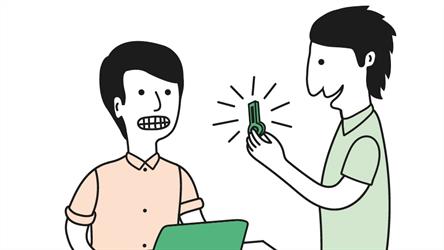Why Facts Don't Change Minds

Why do some people deny climate change or believe the earth is flat? And why do people disagree so strongly on issues such as vaccines or abortion?
Humans are irrational creatures. Unlike robots or artificial intelligence that can be programmed to learn, we attach emotions and ego to our beliefs, according to scientists who study the human brain.
In their book The Enigma of Reason, cognitive scientists Hugo Mercier and Dan Sperber suggest that the human ability to reason is less linked to facts than social standing. Rationality in humans, they argue, evolved to help us win arguments by convincing others and justifying ourselves. Being able to win arguments, more than being factually correct, helps people gain status in society.
Even when confronted with new facts, people are reluctant to change their minds because we don't like feeling wrong, confused or insecure, writes Tali Sharot, an associate professor of cognitive neuroscience and author of The Influential Mind: What the Brain Reveals About Our Power to Change Others.

So people who want to believe they are healthy may avoid going to the doctor. It also explains why big spenders are sometimes loath to check their bank balance. A study by Sharot and her colleagues showed that participants in a virtual stock market were more likely to choose not to know how their investments were doing if they feared they were losing money.
Confirmation bias makes us more likely to seek information that confirms what we want to believe. Studies show that people are quick to accept evidence that supports their beliefs, and more likely to ignore or be critical of facts that challenge their views.
In another experiment, Sharot found that when two people have opposing views, their brains became less sensitive to facts presented by their opponent. While this human bias is not new, being able to access all sorts of information online and "cherry-pick" what to believe moves groups who disagree further into extreme ends, Sharot explains.
If providing facts alone won't change people's minds, what will? A trick is to separate the opinion from the person, by using distancing language such as "the argument" rather than "your argument". Since beliefs are tied up in emotion and identity, avoid mocking others who have different beliefs, writes scientist and law professor Ozan Varol on his blog. That will only make them more likely to resist your views and fall back on their own beliefs.
More tips for beating confirmation bias
Be open to changing your mind. Tell yourself that what you believe is right based on what you currently know. Give yourself room to change your stance if you encounter new information that contradicts what you believe.
Check your expectations. Since we are more likely to believe ideas or information that confirm our prior beliefs, be aware of what your initial beliefs are when you seek information. Similarly, when debating with others, it is useful to know what your opponent's beliefs are if you wish to change their mind.
Find common ground. If you want to move someone else to a desired action, focus on what you both believe to be true. For example, a young and fit person may not think that smoking harms his health, despite facts that show otherwise. But he may be more open to change if the focus shifts to something he agrees with, such as smoking being a drain on expenses.
Seek out disconfirming evidence. Breaking out of echo chambers is a good way to check that your beliefs are rooted in up-to-date facts. Dip into alternative information sources. Befriend those who disagree with your beliefs and challenge yourself to listen without judgement.
- POSTED ON
Apr 12, 2018
- TEXT BY
Tuber
- ILLUSTRATION BY
Brenda Lim









